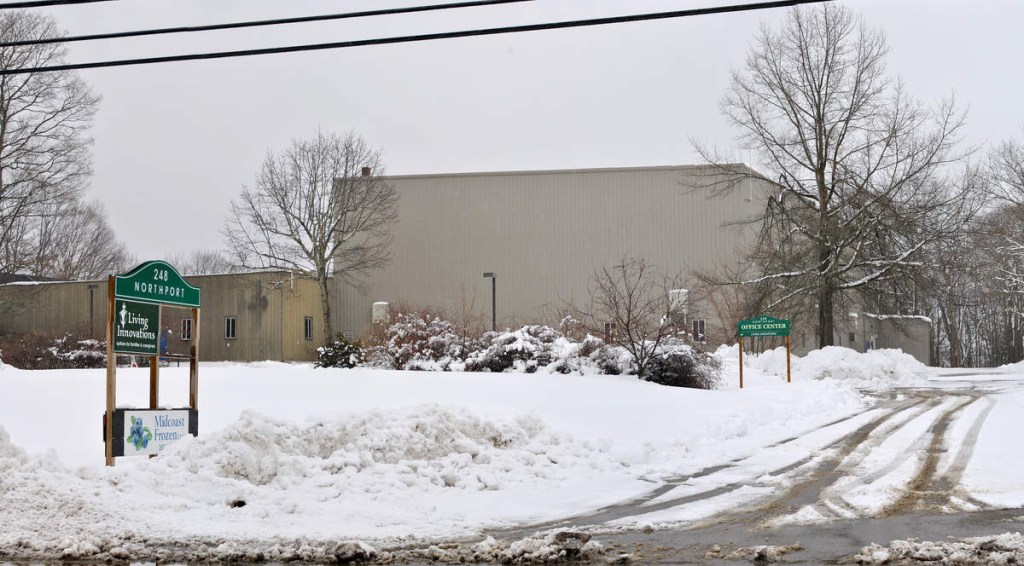BELFAST — A large industrial hemp growing and processing facility could be up and running on Route 1 by the summer.
Future Farm Maine LLC has applied to the city for a change of use permit at 248 Northport Ave. that would allow the company to propagate and process industrial hemp. The building was previously used by tensioned-fabric canopy maker Moss Inc. and Coastal Farms Food Processing. More recently, it has been home to blueberry processor Midcoast Frozen.
City Planner Wayne Marshall said the type of use proposed by Future Farm is similar enough to other businesses that have occupied the space to bypass a review by the planning board even though it is a relatively large operation and a new industry for Belfast.
“We’re viewing it as being a change of one industrial use to another industrial use,” Marshall said. The matter falls under the jurisdiction of the city’s code enforcement officer.
Future Farm Maine, a subsidiary of Canada-based Future Farm Technologies, signed a two-year lease for 12,960 square feet in a 60,000-square-foot building in Maine, with an option to buy, according to a Jan. 30 announcement on the company’s website that didn’t specify the site. However, the company touted the advantages of the building, including high ceilings for vertical growing and a turnkey commercial kitchen, details that match the proposal Future Farm Maine recently submitted to the Belfast Planning Office.
A representative connected to the application submitted to the city did not respond Wednesday to an email seeking more information about the Belfast facility.
Future Farm Maine plans to use the Belfast building for the beginning and end of the industrial hemp production cycles. The company hopes to propagate 250,000 seeds under LED lights, growing them into 6-inch seedlings over a period of several months. The seedlings would be moved by tractor-trailer to a licensed industrial hemp farm elsewhere in Maine for the summer to be raised into mature plants, cut and dried. The dried plants then would be returned to the Belfast facility to be processed and refined to extract cannabidiol, or CBD, oil and high-value isolate for making edibles, creams and lotions.
The company previously acquired a 120-acre industrial hemp farm and signed a lease for 100 acres with an option to lease up to an additional 1,000 acres of farmland in Maine, the January announcement said.
Future Farm Technologies has projects throughout North America, including California, Florida and Maryland. The company’s business model, according to its website, is based on indoor growing of various types of plants, with a focus on cannabis.
Industrial hemp is bred to have very little THC, the psychoactive ingredient that gives users of marijuana, hemp’s cousin in the cannabis family, a high. Future Farm Technologies anticipates the plants grown in Belfast facility would have .03-percent THC or less; marijuana used for medicinal or recreational purposes typically has between 10 and 100 times that amount.
The industrial hemp plants, however, will have higher-than-normal amounts of CBD oil, which is used to treat medical conditions including inflammation and anxiety.
In its January announcement, Future Farm Technologies said the market for CBD is likely to expand following the U.S. Food and Drug Administration’s acceptance of an application by GW Pharmaceuticals for Epidiolex.
The drug, which contains CBD oil, will be worth $2.2 billion in worldwide sales by 2025, according to three Goldman Sachs analysts cited in the announcement. Another source, Hemp Business Journal, put U.S. sales of CBD at $1.1 billion by 2020.
Send questions/comments to the editors.



Success. Please wait for the page to reload. If the page does not reload within 5 seconds, please refresh the page.
Enter your email and password to access comments.
Hi, to comment on stories you must . This profile is in addition to your subscription and website login.
Already have a commenting profile? .
Invalid username/password.
Please check your email to confirm and complete your registration.
Only subscribers are eligible to post comments. Please subscribe or login first for digital access. Here’s why.
Use the form below to reset your password. When you've submitted your account email, we will send an email with a reset code.